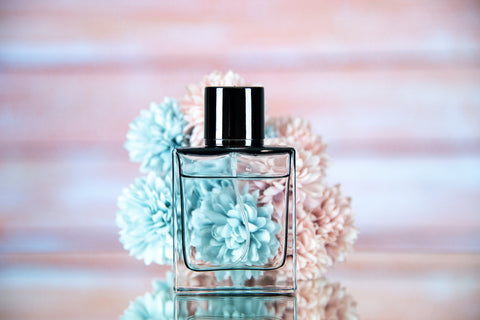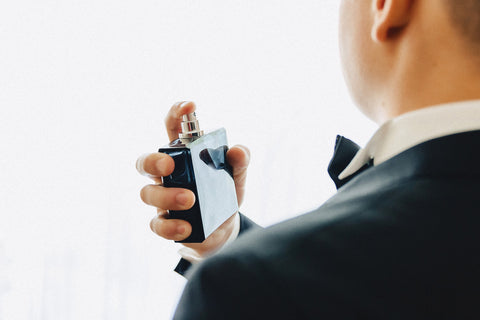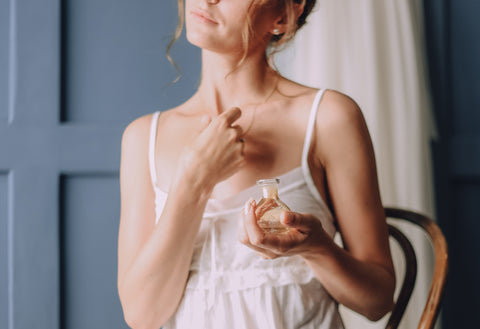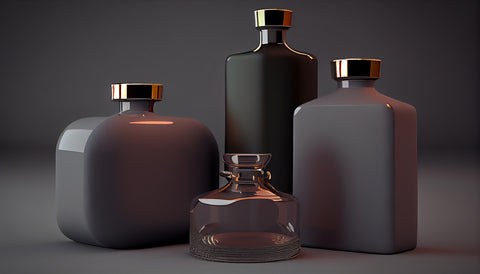Perfume is a captivating blend of aromatic extracts and compounds, its history stretching back millennia. From its earliest applications in ancient civilizations to the sophisticated fragrances of today, perfume has transcended mere fragrance to become an art form and cultural touchstone.
The power of perfume extends far beyond its pleasant scent. It can influence our moods, evoke memories, and shape how we present ourselves to the world.

The Power of Scent
The Olfactory System: A Direct Line to the Emotions
Unlike other senses that relay information through the thalamus, scent takes a more direct route to the emotional core of our being. Odor molecules travel from the nose to the olfactory bulb, located at the base of the brain. This bulb sits right next to the limbic system, the region responsible for processing emotions, memory, and motivation. This close proximity allows scents to bypass conscious thought and have a powerful, immediate impact on how we feel. Additionally, scent perception is highly individual. Our experiences, both positive and negative, can shape how we interpret specific smells. The fresh scent of sunscreen might evoke happy childhood memories of summer vacations for one person, while another might associate it with the unpleasant sting of sunburn.
A Proustian Plunge: Scents as Memory Triggers
Our sense of smell possesses an unparalleled ability to unlock vivid memories and emotions. Marcel Proust, the famed French novelist, famously captured this phenomenon in his masterpiece, "Swann's Way," where the taste of a madeleine cookie dipped in tea instantly transports the narrator back to his childhood. This powerful connection between scent and memory is rooted in the concept of olfactory memory. Unlike other sensory memories, which fade over time, olfactory memories tend to be more vivid and emotionally charged. A whiff of freshly baked bread might take you back to your grandmother's kitchen, or the scent of a specific cologne could trigger a long-forgotten romance. These olfactory flashbacks can be surprisingly detailed, transporting us not just to a particular event but also to the emotions we felt at that time.
The Allure of Aroma: Scents and Attraction
The science of human attraction is complex, and scent plays a potential role in this intricate dance. Pheromones, chemical signals produced by the body, can influence how we perceive others. While the role of pheromones in human attraction remains a topic of ongoing research, some studies suggest that certain scents can be perceived as more desirable. For example, studies have shown that women may find the scent of testosterone in men more attractive during ovulation. However, it's important to remember that attraction is a multifaceted phenomenon influenced by cultural background, personal experiences, and physical appearance. Scent can certainly play a part, but it's just one piece of the puzzle.

Perfume Throughout History: A Fragrant Journey
The Dawn of Fragrance: Ancient Perfumery
The history of perfume stretches back millennia, its roots intertwined with the development of ancient civilizations. In Egypt, fragrant oils and resins played a central role in religious ceremonies and daily life. Egyptians believed scent offerings appease the gods, and they used perfumes for embalming, cosmetics, and personal hygiene. Similarly, in Mesopotamia, scented resins and oils were burned in temples and used for medicinal purposes. Evidence suggests the world's first recorded perfumer may have been a Babylonian woman named Tapputi, who lived around 2,000 BCE. China also boasts a rich history of perfumery, with scented oils and incense used in traditional medicine and religious rituals for centuries.
The Blossoming of Perfumery: Medieval and Renaissance Europe
The development of sophisticated perfume-making techniques in Europe during the Middle Ages and Renaissance marked a turning point in the history of fragrance. Trade routes with the East introduced Europeans to new aromatic materials like musk, amber, and cloves. Skilled alchemists and apothecaries experimented with these ingredients, creating complex and expensive perfumes reserved for the wealthy elite. Perfume became a symbol of social status and luxury, with royalty and nobility vying for the most exquisite and rare scents. Queen Elizabeth I of England, for instance, was known for her love of perfume and her signature blend of roses, violets, and musk.
A Shift in Scents: The Evolution of Fragrance Preferences
Perfume preferences have undergone a fascinating evolution throughout history. The heavy, musky scents favored by ancient civilizations and medieval Europe gradually gave way to lighter and more floral notes in the 18th century. This shift can be attributed to several factors, including advances in hygiene practices and a growing appreciation for natural scents. The Victorian era saw a renewed interest in floral fragrances, with rose, lavender, and jasmine becoming popular ingredients. The 20th century ushered in the era of modern perfumery with the development of synthetic fragrance materials. These synthetic molecules allowed perfumers to create a wider range of scents at a more affordable price. Today, perfume preferences are diverse and reflect individual tastes and cultural influences. While some still appreciate classic floral fragrances, others favor bolder, more contemporary scents that incorporate oriental notes, citrusy accords, or musky depths.

The Allure of Perfume
Scentscapes of Self: Fragrance as Identity
Perfume transcends mere fragrance; it becomes a tool for self-expression, a way to curate an olfactory identity that reflects who we are or who we aspire to be. Just like the clothes we wear, the scents we choose can communicate a message about our personality, mood, and style. A fresh citrusy fragrance might project a sense of energy and optimism, while a warm, oriental scent can evoke mystery and sophistication. Selecting a signature scent, a fragrance that becomes uniquely associated with you, can further solidify this connection between perfume and identity. This signature scent can become a familiar comfort, a personal brand that lingers in the memory of those we encounter. However, it's important to acknowledge the influence of marketing and advertising in shaping our perception of different perfumes. The way a fragrance is presented, the imagery and language used, can all influence our association with the scent and the identity it conveys.
Confidence in a Bottle: The Mood-Boosting Power of Perfume
The psychological impact of perfume extends beyond self-expression. Studies suggest that wearing a scent you enjoy can have a significant positive effect on your mood and confidence. Our sense of smell is intricately linked to the limbic system, the part of the brain responsible for emotions and memory. Certain scents can trigger the release of mood-enhancing chemicals like dopamine and serotonin. For example, research suggests that floral scents like lavender and jasmine can promote relaxation and reduce anxiety, while citrus notes like grapefruit and lemon can be energizing and uplifting. The key lies in choosing a fragrance that resonates with you personally. A scent you find unpleasant is unlikely to boost your confidence, even if it's marketed as mood-enhancing.
A Whispered Invitation: The Allure of Scent and Seduction
Throughout history, perfume has been intertwined with the art of seduction. Ancient Egyptians used fragrant oils and incenses to heighten their attractiveness, and the practice continued in various cultures around the world. Certain scents have been associated with romantic allure, such as musk, rose, and jasmine. While the science of attraction is complex and scent is just one factor, some studies suggest that certain fragrances can be perceived as more desirable. However, the power of seduction lies not just in the scent itself but in the confidence and self-awareness it projects. A fragrance you love can elevate your mood and make you feel more attractive, which can in turn make you more captivating to others.

The Art of Wearing Perfume
Finding Your Olfactory Harmony: Selecting the Perfect Perfume
Choosing the right perfume is a personal journey of exploration. Consider your personal preference above all else. Do you gravitate towards fresh and clean scents, or do you prefer the warmth of oriental notes? Familiarize yourself with the different fragrance families, each with its own distinct character. Floral fragrances, for example, are often light and romantic, while oriental scents tend to be richer and more complex, with notes like amber, vanilla, and sandalwood. Skin chemistry also plays a role. The way a perfume interacts with your unique body chemistry can significantly alter its scent. It's always best to test a fragrance on your skin before committing to a purchase. Apply a small amount to a pulse point and allow it to develop for a few hours. This will give you a better idea of how the scent evolves on your skin and how it complements your natural aroma. Consider the occasion when selecting a fragrance. A bolder scent might be appropriate for a night out, while a lighter option might be more suitable for work or daytime wear.
The Art of Application: Unleashing the Fragrance's Potential
Once you've found your perfect perfume, proper application is key to maximizing its impact. Pulse points, areas where blood vessels are close to the skin's surface, are ideal for fragrance application. These include the wrists, inner elbows, behind the ears, and at the base of the throat. The warmth of these areas helps to project the scent throughout the day. A gentle dab or spray on each pulse point is sufficient. Less is always more when it comes to perfume. Over-application can overwhelm not only yourself but those around you. Additionally, avoid rubbing your wrists together after applying, as this can break down the fragrance molecules and alter the scent.
Fragrance Etiquette: Scentsational Consideration for Others
While perfume can be a powerful tool for self-expression, it's important to be mindful of others' sensitivities. Many workplaces and public spaces have become fragrance-free zones to accommodate those with allergies or respiratory issues. Always be respectful of these designated areas and choose a more subtle approach to fragrance if necessary. In general, it's wise to err on the side of caution when applying perfume in close quarters. A light spritz should be plenty to leave a pleasant and lingering impression without overwhelming those around you. Respecting personal boundaries is key. If someone expresses discomfort with your perfume, be courteous and adjust accordingly. Remember, the goal is to enhance your presence, not to dominate a room with your scent.

The Cultural Significance of Perfume: A Fragrant Tapestry
A Scented Journey: Perfume in Cultural Traditions
Perfume transcends its personal allure to become deeply woven into the fabric of various cultures around the world. In India, fragrant incense and oils play a central role in religious ceremonies. Sandalwood, jasmine, and agarwood are frequently used offerings, believed to purify the atmosphere and appease deities. Similarly, in Japan, the traditional Kodo ceremony elevates the appreciation of perfume to an art form. Participants gather to experience the subtle nuances of different incense aromas, fostering a sense of peace and mindfulness. Coming-of-age rituals in many cultures often involve the use of specific fragrances. In some African cultures, young women might be adorned with scented oils and body paints during their transition to womanhood. These fragrant applications not only enhance beauty but also hold symbolic meaning, marking a passage into a new stage of life.
A World of Scents: Regional Preferences and Influences
Cultural preferences for fragrance can vary dramatically depending on geographic location and tradition. Climate plays a significant role. In hotter climates, lighter and fresher scents like citrus or florals are often favored, while colder regions might gravitate towards richer and warmer fragrances like orientals or ambers. The availability of traditional ingredients also shapes regional preferences. The Middle East is renowned for its oud, a precious resin with a deep, woody aroma, which features prominently in many regional perfumes. Social norms further influence fragrance choices. In some cultures, strong perfumes are considered a sign of sophistication and wealth, while others favor a more understated approach. For example, in Western cultures, perfume application tends to be more moderate compared to some Asian countries, where layering different scented oils and body products is a common practice. Understanding these cultural nuances around fragrance can help us appreciate the diverse and fascinating world of scent.

The Future of Perfume: A Fragrant Horizon
Sustainability in Scents: Ethical Sourcing and Eco-Conscious Practices
As environmental consciousness grows, the perfume industry is embracing sustainable practices and ethical sourcing. Consumers are increasingly interested in fragrances derived from natural ingredients harvested responsibly. This means ensuring ingredients are cultivated without harming the environment or exploiting local communities. The industry is exploring alternatives to traditional methods, such as using upcycled ingredients or synthetic molecules derived from renewable resources. Additionally, the use of recycled materials in packaging is becoming more prevalent, reducing the environmental footprint of perfume production.
A Brave New World of Scents: Technological Advancements
The future of perfume holds exciting possibilities thanks to technological advancements. Artificial intelligence (AI) is making waves in the fragrance industry. AI algorithms can analyze vast amounts of data on consumer preferences, fragrance trends, and even individual olfactory profiles. This information can be used to create personalized scents tailored to specific tastes and even emotional states. Imagine a perfume that adapts to your mood throughout the day, offering a calming aroma in stressful situations or an uplifting scent to boost your energy. Furthermore, advancements in scent delivery systems may allow for the creation of multidimensional olfactory experiences. Imagine walking through a virtual reality environment where the digital world is not just visual but also has a corresponding fragrance, further immersing you in the experience. The future of perfume promises to be not just fragrant but also innovative and technologically driven.
Conclusion
Perfume's enduring allure lies in its multifaceted nature, weaving together history, culture, emotion, and self-expression. From its ancient origins in religious ceremonies and medicinal practices to its evolution into a sophisticated art form, perfume has left an indelible mark on human civilization.
Beyond its historical significance, perfume's impact on our emotions and self-perception is undeniable. The evocative power of scent allows us to relive cherished memories, boost our confidence, and project a desired image. A spritz of a familiar fragrance can transport us back to a childhood summer spent with loved ones, while a carefully chosen perfume can elevate our mood and make us feel more empowered.
Ultimately, perfume is a powerful tool for self-expression. It allows us to curate an olfactory identity that reflects who we are or who we aspire to be. It can be a whispered invitation, hinting at our personality and style. The right fragrance can act as a confidence booster, enhancing our mood and making us feel more attractive. Perhaps most importantly, perfume can be a bridge connecting us to others. A shared appreciation for a particular scent can spark conversation, and a carefully chosen perfume can leave a lasting and positive impression. In a world saturated with visual stimuli, perfume offers a unique and powerful way to connect with ourselves and the world around us.
The future of perfume promises to be as exciting as its past, with advancements in technology paving the way for personalized scents and even more immersive olfactory experiences. One thing remains certain: perfume's captivating power to influence our emotions, memories, and social interactions ensures its place as a cherished cultural treasure for generations to come.

